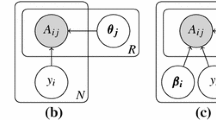Abstract
Crowdsourcing has been an effective and efficient paradigm for providing labels for large-scale unlabeled data. In the past few years, many methods have been developed for inferring labels from the crowd, but few theoretical analyses have been presented to support this popular human-machine interaction process. In this paper, we theoretically study the quality of labels inferred from crowd workers by majority voting and provide an analysis of label quality that shows that the label error rate decreases exponentially with the number of workers selected for each task. We also study the problem of eliminating low-quality workers from the crowd, and provide a conservative condition for eliminating low-quality workers without eliminating any non-low-quality worker with high probability. We also provide an aggressive condition for eliminating all low-quality workers with high probability.
摘要
创新点
众包目前已成为一种给大数据提供标记的有效范式。在过去的几年中, 出现了很多依据众包提供的伪标记来推理数据真实标记的算法, 但很少有分析工作出现来为这种流行的人机交互过程提供理论支撑。本文从理论上研究众包中利用多数投票策略推理标记的质量, 理论分析表明标记的错误率随着为同一任务分配雇员数的增加呈指数级降低。此外, 本文还从理论上分析如何去除低质量的雇员, 提出一种能够以较高概率去除低质量雇员却不去除任何非低质量雇员的保守条件和一种能够以较高概率去除所有低质量雇员的激进条件。
Similar content being viewed by others
References
Howe J. The rise of crowdsourcing. Wired, 2006, 14.06
Howe J. Crowdsourcing: Why the Power of the Crowd Is Driving the Future of Business. New York: Crown Publishing Group, 2008
Sheng V S, Provost F J, Ipeirotis P G. Get another label? Improving data quality and data mining using multiple, noisy labelers. In: Proceedings of the 14th ACM SIGKDD International Conference on Knowledge Discovery and Data Mining, Las Vegas, 2008. 614–622
Snow R, O’Connor B, Jurafsky D, et al. Cheap and fast—but is it good? Evaluating non-expert annotations for natural language tasks. In: Proceedings of the Conference on Empirical Methods in Natural Language Processing, Honolulu, 2008. 254–263
Sorokin A, Forsyth D. Utility data annotation with Amazon Mechanical Turk. In: Proceedings of the 2008 IEEE Computer Society Conference on Computer Vision and Pattern Recognition Workshop on Internet Vision, Anchorage, 2008. 1–8
Dempster A, Laird N, Rubin D. Maximum likelihood from incomplete data via the em algorithm. J Roy Stat Soc Ser B, 1977, 39: 1–38
Raykar V C, Yu S, Zhao L H, et al. Supervised learning from multiple experts: whom to trust when everyone lies a bit. In: Proceedings of the 26th International Conference on Machine Learning, Quebec, 2009
Raykar V C, Yu S, Zhao L H, et al. Learning from crowds. J Mach Learn Res, 2010, 11: 1297–1322
Whitehill J, Ruvolo P, Wu T, et al. Whose vote should count more: Optimal integration of labels from labelers of unknown expertise. In: Bengio Y, Schuurmans D, Lafferty J D, et al., eds. Advances in Neural Information Processing Systems 22. Cambridge: MIT Press, 2009. 2035–2043
Welinder P, Branson S, Belongie S, et al. The multidimensional wisdom of crowds. In: Lafferty J D, Williams C K I, Shawe-Taylor J, et al., eds. Advances in Neural Information Processing Systems 23. Cambridge: MIT Press, 2010. 2424–2432
Raykar V C, Yu S. Eliminating spammers and ranking annotators for crowdsourced labeling tasks. J Mach Learn Res, 2012, 13: 491–518
Liu Q, Peng J, Ihler A T. Variational inference for crowdsourcing. In: Bartlett P L, Pereira F C N, Burges C J C, et al., eds. Advances in Neural Information Processing Systems 25. Cambridge: MIT Press, 2012. 701–709
Zhou D, Platt J C, Basu S, et al. Learning from the wisdom of crowds by minimax entropy. In: Bartlett P L, Pereira F C N, Burges C J C, et al., eds. Advances in Neural Information Processing Systems 25. Cambridge: MIT Press, 2012. 2204–2212
Yan Y, Rosales R, Fung G, et al. Active learning from crowds. In: Proceedings of the 28th International Conference on Machine Learning, Bellevue, 2011. 1161–1168
Wauthier F L, Jordan M I. Bayesian bias mitigation for crowdsourcing. In: Shawe-Taylor J, Zemel R S, Bartlett P L, et al., eds. Advances in Neural Information Processing Systems 24. Cambridge: MIT Press, 2011. 1800–1808
Karger D R, Oh S, Shah D. Iterative learning for reliable crowdsourcing systems. In: Shawe-Taylor J, Zemel R S, Bartlett P L, et al., eds. Advances in Neural Information Processing Systems 24. Cambridge: MIT Press, 2011. 1953–1961
Auer P, Cesa-Bianchi N, Freund Y, et al. The nonstochastic multiarmed bandit problem. SIAM J Comput, 2003, 32: 48–77
Ho C-J, Vaughan JW. Online task assignment in crowdsourcing markets. In: Proceedings of the 26th AAAI Conference on Artificial Intelligence, Toronto, 2012
Buchbinder N, Naor J. Online primal-dual algorithms for covering and packing problems. In: Proceedings of the 13th Annual European Symposium, Palma de Mallorca, 2005. 689–701
Ho C-J, Jabbari S, Vaughan J W. Adaptive task assignment for crowdsourced classification. In: Proceedings of the 30th International Conference on Machine Learning, Atlanta, 2013. 534–542
Chen X, Lin Q, Zhou D. Optimistic knowledge gradient policy for optimal budget allocation in crowdsourcing. In: Proceedings of the 30th International Conference on Machine Learning, Atlanta, 2013. 64–72
Dekel O, Shamir O. Vox populi: Collecting high-quality labels from a crowd. In: Proceedings of the 22nd Conference on Learning Theory, Quebec, 2009
Tran-Thanh L, Stein S, Rogers A, et al. Efficient crowdsourcing of unknown experts using multi-armed bandits. In: Proceedings of the 20th European Conference on Artificial Intelligence, Montpellier, 2012. 768–773
Abraham I, Alonso O, Kandylas V, et al. Adaptive crowdsourcing algorithms for the bandit survey problem. In: Proceedings of the 26th Annual Conference on Learning Theory, Princeton, 2013. 882–910
Tsybakov A. Optimal aggregation of classifiers in statistical learning. Ann Stat, 2004, 32: 135–166
Author information
Authors and Affiliations
Corresponding author
Rights and permissions
About this article
Cite this article
Wang, W., Zhou, ZH. Crowdsourcing label quality: a theoretical analysis. Sci. China Inf. Sci. 58, 1–12 (2015). https://doi.org/10.1007/s11432-015-5391-x
Received:
Accepted:
Published:
Issue Date:
DOI: https://doi.org/10.1007/s11432-015-5391-x




